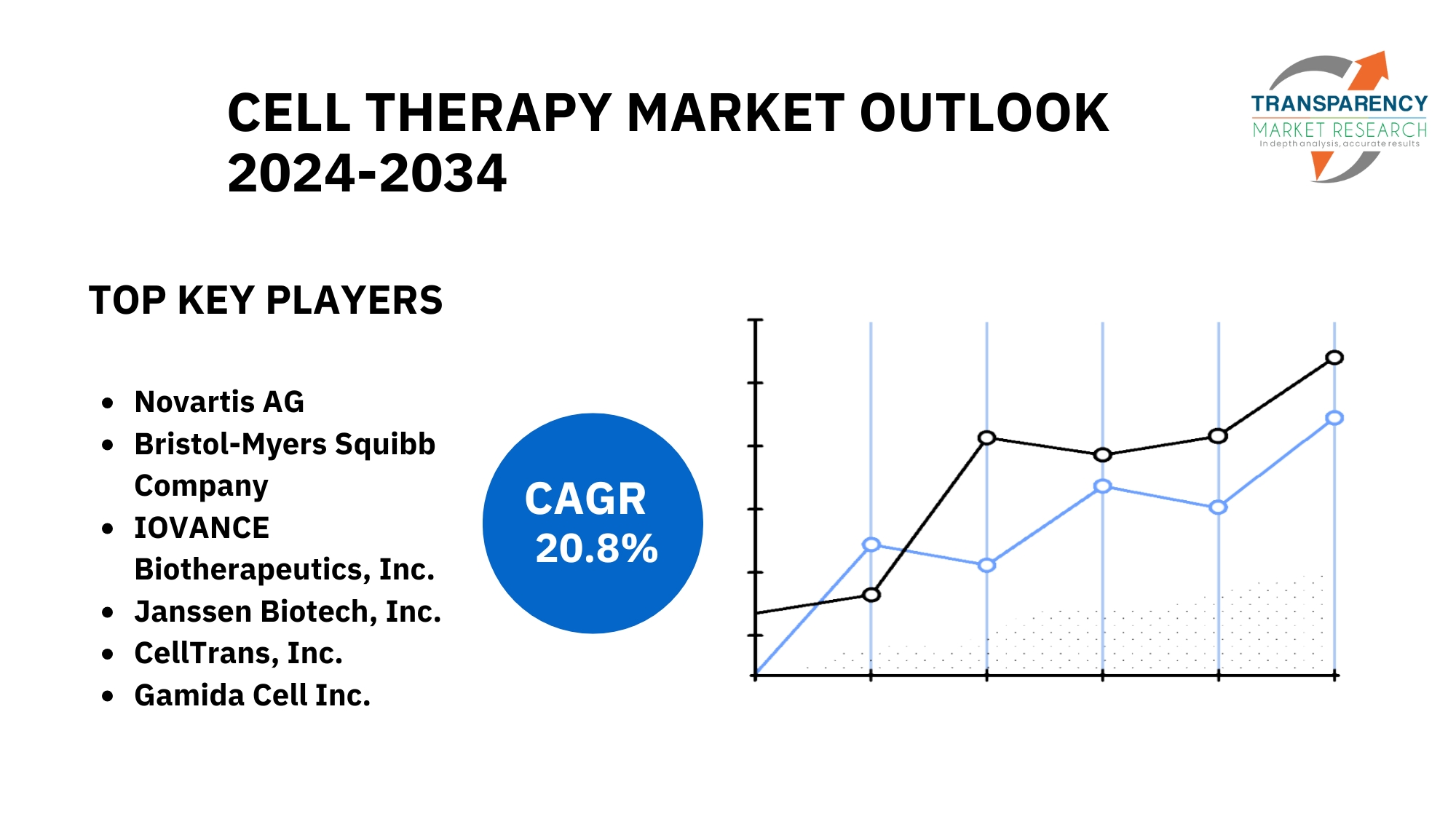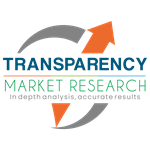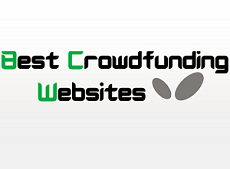
Cell Therapy Market Outlook 2034: Rapid Growth Projected with a 20.8% CAGR, Set to Reach US$ 44.6 Billion, Latest Report by TMR
Global Cell Therapy market is driven by increasing demand for advanced therapies in oncology, regenerative medicine, and immunology. The market's expansion is also fueled by continuous innovations in cell-based treatments and the growing adoption of personalized medicine approaches.
/EIN News/ -- Wilmington, Delaware, Transparency Market Research Inc. –, Jan. 21, 2025 (GLOBE NEWSWIRE) -- The cell therapy market is rapidly evolving, driven by groundbreaking advancements in medical research and the increasing adoption of innovative treatments across multiple therapeutic areas. With the global industry valued at US$ 4.8 billion in 2023, the market is set to witness extraordinary growth, with a projected compound annual growth rate (CAGR) of 20.8% from 2024 to 2034, reaching more than US$ 44.6 billion by the end of this period. The substantial growth of the cell therapy market reflects its critical role in revolutionizing healthcare, especially in areas like oncology, autoimmune disorders, and neurological diseases.
Prominent players in the cell therapy market (mercado de terapia cellular) include industry leaders such as Novartis AG, Bristol-Myers Squibb Company, Iovance Biotherapeutics, Inc., Janssen Biotech, Inc., CellTrans, Inc., Gamida Cell Inc., Dendreon Pharmaceuticals LLC, Kite Pharma, Inc., Adaptimmune, and Takeda Pharmaceutical Company Limited.
These companies, along with emerging players, are at the forefront of the market, making strategic investments in research, development, and partnerships to introduce cutting-edge treatments and expand their product portfolios.
Request a Detailed PDF Brochure - https://www.transparencymarketresearch.com/sample/sample.php?flag=S&rep_id=63273

Key Market Drivers and Trends
1. T-cell Therapies Leading the Charge
T-cell therapies, particularly Chimeric Antigen Receptor (CAR) T-cells, are revolutionizing cancer treatment. CAR T-cell therapies have made tremendous strides in the treatment of blood cancers, including leukemia and lymphoma. With FDA approvals and positive clinical trial results, this segment is rapidly expanding. The ability to use a patient's own cells to create personalized treatments has not only proven effective but also promises to extend into treating solid tumors in the future.
In parallel, the growing acceptance and development of tumor-infiltrating lymphocytes (TILs) and T-cell receptors are making waves in the oncology field, significantly enhancing immune-based cancer therapies. Companies like Iovance Biotherapeutics are focusing on TIL therapies, which have shown promise in treating melanoma and other solid tumors.
2. Stem Cell and Natural Killer Cell Advancements
Stem cell therapies are also seeing rapid advancements, with research focusing on how stem cells can regenerate damaged tissues and treat a range of conditions from neurological disorders to cardiovascular diseases. The potential for stem cells to repair or replace damaged cells makes them an attractive option for regenerative medicine.
Additionally, Natural Killer (NK) cells and dendritic cells are gaining traction as key players in the immunotherapy space. NK cells, which can target a wide range of tumor cells, and dendritic cells, which play a pivotal role in initiating immune responses, are being studied extensively for their ability to fight cancer and regulate immune system functions.
3. Personalized and Autologous Therapies
Personalized medicine, which tailors treatments to an individual’s genetic makeup, is another key driver of the cell therapy market. Autologous therapies, where the patient's own cells are used, have been at the forefront of this trend. These therapies have minimal risk of immune rejection, making them highly effective in treating a variety of conditions. CAR T-cell therapies, a prime example of autologous treatments, are showing immense promise in treating cancers and other chronic diseases.
4. Strategic Partnerships Fueling Market Expansion
Strategic collaborations are a driving force behind the market’s rapid growth. Pharmaceutical giants such as Novartis and Bristol-Myers Squibb have entered into key partnerships with biotech firms to expand their cell therapy portfolios. These alliances are helping to accelerate the development and commercialization of novel therapies.
Smaller players, including CellTrans, Inc. and Gamida Cell Inc., are also making notable strides, developing specialized cell therapies that complement the broader market offerings. As the competition intensifies, companies are investing in innovation, enhancing their market presence through new product development and market expansion.
Get Customized Insights & Analysis for Your Business Needs: https://www.transparencymarketresearch.com/sample/sample.php?flag=S&rep_id=63273
Segmentation Analysis
The cell therapy market is broad and diverse, with several key segments driving its growth. These segments can be broken down by therapy type, origin, therapeutic area, and region.
1. Cell Therapy Type
-
T-cell Therapy:
T-cell therapies, including CAR T-cells, T-cell receptors, and tumor-infiltrating lymphocytes (TILs), are among the most promising innovations in cancer treatment. CAR T-cells, in particular, have made a significant impact in treating hematological cancers and are expanding into solid tumors. -
Stem Cell Therapy:
Stem cells are used to regenerate damaged tissues and offer hope in treating diseases like Parkinson’s, Alzheimer’s, and heart disease. Stem cell-based therapies are gaining momentum, particularly in regenerative medicine. -
Natural Killer (NK) Cells and Dendritic Cells:
NK cells, which play a key role in the body’s defense against cancers, and dendritic cells, which initiate immune responses, are gaining traction as alternative immunotherapies in cancer treatment.
2. Origin
-
Autologous Therapies:
In autologous therapies, a patient’s own cells are used for treatment. These therapies are becoming increasingly popular due to their lower risk of immune rejection. CAR T-cell therapies, in particular, are one of the most well-known examples of autologous treatments. -
Allogenic Therapies:
Allogenic cell therapies involve cells from a donor. These therapies have the potential to treat multiple patients with a single donation and are particularly beneficial in treating diseases like autoimmune disorders and blood cancers.
3. Therapeutic Area
-
Oncological Disorders:
The oncology segment is the largest and fastest-growing segment in the cell therapy market. The success of CAR T-cells and TIL therapies in treating cancers such as leukemia, lymphoma, and melanoma is driving this growth. Clinical trials continue to show promising results for solid tumors, fueling future demand for cell-based treatments in oncology. -
Autoimmune Disorders:
Cell therapies are gaining recognition in the treatment of autoimmune diseases such as rheumatoid arthritis and multiple sclerosis. Mesenchymal stem cells (MSCs) and other cell types are being researched for their potential to modulate the immune system and reduce inflammation. -
Neurological Disorders:
Stem cell therapies hold considerable promise in treating neurological disorders, such as Parkinson’s disease, Alzheimer’s disease, and spinal cord injuries. Regenerating damaged nerve cells offers hope for patients suffering from debilitating conditions that currently lack effective treatments.
4. Regions Covered
-
North America:
North America holds the largest share of the cell therapy market, driven by robust healthcare infrastructure, strong R&D investments, and high adoption rates of advanced therapies. The United States, in particular, is home to several pioneering biotech companies and is a leader in the commercialization of cell therapies. -
Europe:
Europe is another major player in the global cell therapy market, with significant contributions from the UK, Germany, and Switzerland. The region has a strong clinical research environment, which supports the growth of cell-based treatments, particularly in oncology and autoimmune diseases. -
Asia Pacific:
The Asia Pacific region is expected to witness the fastest growth in the coming years, with countries like China, Japan, and India investing heavily in healthcare innovation. The large patient population and increasing demand for advanced therapies are key drivers of this growth. -
Latin America and Middle East & Africa:
While still in the early stages, the cell therapy market in Latin America and the Middle East & Africa is gradually expanding. With increasing focus on improving healthcare systems and greater access to advanced therapies, these regions are expected to see steady growth in the coming decade.
Buy This Premium Research Report Now to Get Detailed Analysis: https://www.transparencymarketresearch.com/checkout.php?rep_id=63273<ype=S
Market Outlook and Future Prospects
The global cell therapy market is on the brink of transformative growth, fueled by ongoing research, technological advancements, and an increasing number of FDA-approved therapies. The demand for personalized, regenerative, and immune-based treatments is driving innovation, with leading players like Novartis, Bristol-Myers Squibb, and Takeda Pharmaceutical Company taking significant steps to expand their product portfolios.
As clinical trials continue to yield positive results, and with new strategic partnerships fostering further development, the market is expected to continue its rapid expansion. The combined efforts of large pharmaceutical companies and emerging biotech firms are setting the stage for a healthcare revolution, where cell therapies offer patients new hope for treating previously incurable diseases.
By 2034, the cell therapy market will be a cornerstone of modern medicine, with its impact spanning oncology, autoimmune disorders, neurological diseases, and beyond. As the technology advances, the future of healthcare looks poised for a paradigm shift, where cell-based treatments offer life-saving potential across a wide range of medical conditions.
Explore Latest Research Reports by Transparency Market Research:
- Single-Cell Analysis Market – (단일 세포 분석 시장) is expected to advance at a CAGR of 13.9% from 2024 to 2034 and reach US$ 14.8 Billion by the end of 2034.
- HER2 Antibodies Market – (HER2 항체 시장) is estimated to grow at a CAGR of 5.1% from 2024 to 2034 and reach US$ 15.7 Bilion by the end of 2034.
About Transparency Market Research
Transparency Market Research, a global market research company registered at Wilmington, Delaware, United States, provides custom research and consulting services. Our exclusive blend of quantitative forecasting and trends analysis provides forward-looking insights for thousands of decision makers. Our experienced team of Analysts, Researchers, and Consultants use proprietary data sources and various tools & techniques to gather and analyses information.
Our data repository is continuously updated and revised by a team of research experts, so that it always reflects the latest trends and information. With a broad research and analysis capability, Transparency Market Research employs rigorous primary and secondary research techniques in developing distinctive data sets and research material for business reports.
Contact:
Transparency Market Research Inc.
CORPORATE HEADQUARTER DOWNTOWN,
1000 N. West Street,
Suite 1200, Wilmington, Delaware 19801 USA
Tel: +1-518-618-1030
USA – Canada Toll Free: 866-552-3453
Website: https://www.transparencymarketresearch.com
Email: sales@transparencymarketresearch.com
Follow Us: LinkedIn| Twitter| Blog | YouTube

Distribution channels: Business & Economy, Media, Advertising & PR, Science ...
Legal Disclaimer:
EIN Presswire provides this news content "as is" without warranty of any kind. We do not accept any responsibility or liability for the accuracy, content, images, videos, licenses, completeness, legality, or reliability of the information contained in this article. If you have any complaints or copyright issues related to this article, kindly contact the author above.
Submit your press release



